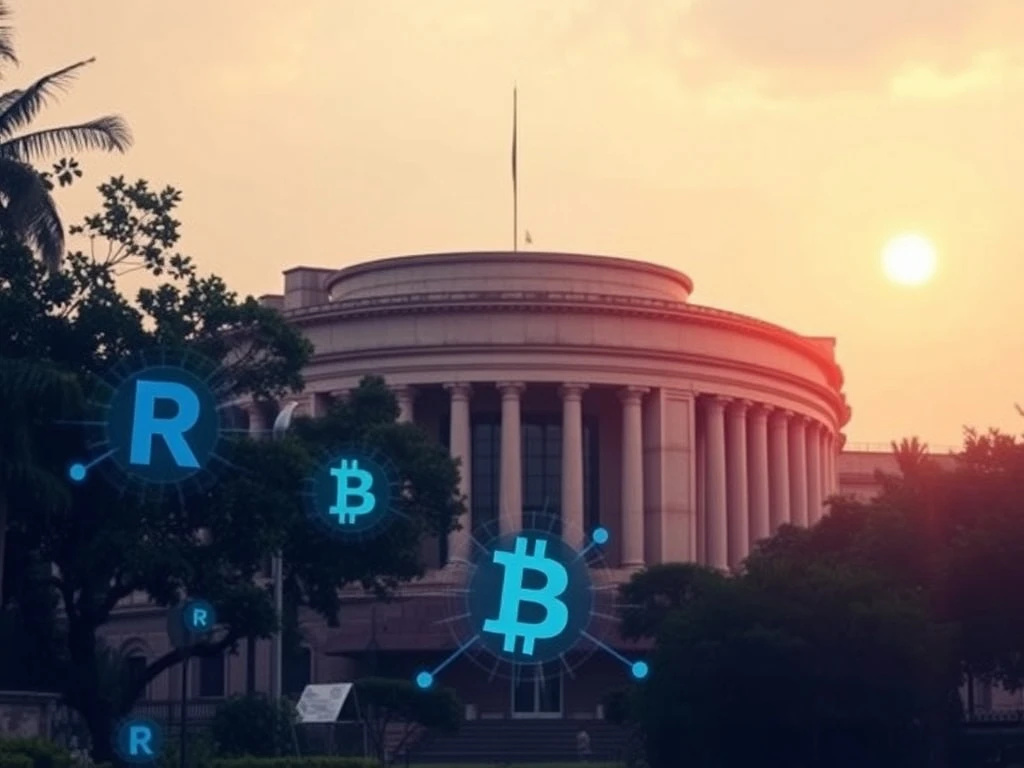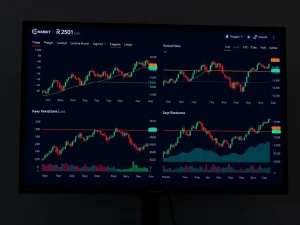India Crypto Regulation: RBI Raises Alarming Systemic Risk Concerns

The landscape of digital assets consistently evolves. However, in India, the Reserve Bank of India (RBI) maintains a cautious stance. Recent reports indicate that the central bank warns that formal India crypto regulation could inadvertently legitimize the sector. This move, they believe, risks creating significant systemic challenges. This ongoing debate highlights the complex relationship between innovation and financial stability within the nation.
RBI’s Alarming Stance on Digital Assets
Indian regulators are reportedly delaying comprehensive cryptocurrency rules. They fear that formal regulation might legitimize digital assets. Furthermore, these rules could introduce systemic risks to the financial system. According to a Reuters report, which cited viewed documents, the RBI crypto position remains firm. Containing the inherent risks posed by cryptocurrencies through regulation presents a significant challenge. This perspective shapes India’s cautious approach.
The document reportedly states that regulating cryptocurrencies would grant them legitimacy. This action, consequently, would cause the sector to become systemic. This implies that crypto’s integration could impact broader financial stability. An outright ban on cryptocurrencies, the document continued, would address the alarming risks of speculative crypto assets. However, it acknowledged a ban could not tackle peer-to-peer transfers or trades on decentralized exchanges. India currently lacks comprehensive crypto regulation, but it has imposed specific restrictions. Therefore, the dilemma persists for policymakers.

Navigating Current Crypto Tax India and Compliance
While India lacks clear, overarching rules for crypto, the government has implemented certain fiscal measures. Specifically, it imposes a 30% tax on digital asset gains. This significant tax rate affects all cryptocurrency transactions. Additionally, foreign crypto exchanges must register with local regulators. These measures aim to bring some level of accountability to the burgeoning market.
In late 2023, India’s Financial Intelligence Unit (FIU) requested blocks on several global crypto exchanges. These included Binance, KuCoin, Huobi, Kraken, Gate.io, Bittrex, Bitstamp, MEXC Global, and Bitfinex. The reason for these blocks was their failure to register with the FIU. Subsequently, both Binance and KuCoin returned to the country in 2024. They obtained approval from the FIU to offer their services in India. Moreover, regulators impose Anti-Money Laundering (AML) rules on locally operating crypto businesses. This ensures a degree of financial oversight. These steps show a clear intent to manage, if not fully embrace, the crypto ecosystem.
The Paradox of India Crypto Adoption
Despite the country’s apparent hostility to the cryptocurrency industry, India leads in crypto adoption. The 2025 Geography of Crypto Report, recently published by crypto forensics firm Chainalysis, revealed this trend. India leads in crypto adoption across all categories. This fact highlights a significant paradox. Government officials have even disclosed personal holdings. For example, Minister Jayant Chaudhary reported his crypto portfolio grew 19% to about $25,500. This indicates a growing individual interest.
Still, industry figures note a gap. The adoption metrics do not always reflect actual usage. Mithil Thakore, CEO of crypto platform Velar, observed this discrepancy. He stated, “The fact that metrics say one thing, and reality presents a contrasting image, suggests that India stands at a paradoxical crossroads.” This indicates that while many people own crypto, its integration into daily economic life might be limited. The nation grapples with this unique challenge. Balancing widespread interest with regulatory caution remains a key task.
Understanding Systemic Risk Crypto Poses
The Reserve Bank of India’s primary concern revolves around the potential for systemic risk crypto assets could introduce. When a sector becomes systemic, its failure could trigger a cascade of failures across the entire financial system. The RBI views cryptocurrencies as inherently volatile and speculative. Therefore, their widespread adoption and integration could expose traditional financial institutions to unprecedented risks. This perspective underpins their cautious approach to regulation.
Furthermore, the RBI worries about the lack of central oversight. Decentralized nature means no single entity controls the market. This makes traditional monetary policy tools ineffective. Financial stability could erode rapidly. Money laundering and terrorist financing are also serious concerns. The anonymity offered by some cryptocurrencies complicates tracking illicit funds. These factors contribute to the RBI’s reluctance to legitimize the sector. They prioritize national financial security above all else.
The Future of India Crypto Regulation: An Uncertain Path
The path forward for India crypto regulation remains unclear. The government faces pressure from both domestic and international stakeholders. On one hand, the thriving crypto community advocates for clear, progressive rules. They argue that a robust framework would foster innovation and economic growth. On the other hand, the RBI emphasizes caution. It prioritizes financial stability and consumer protection. This creates a difficult balancing act for policymakers.
The current state of partial restrictions and high taxes indicates a desire to control rather than fully ban. However, the explicit warning about legitimization suggests a deeper reluctance to integrate crypto into the mainstream financial system. Future policies could lean towards a more restrictive environment. Alternatively, a global consensus on crypto regulation might influence India’s approach. The ongoing dialogue between government bodies, industry leaders, and international organizations will ultimately shape India’s crypto destiny. For now, uncertainty continues to define the market.









